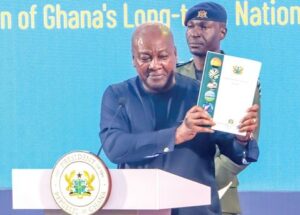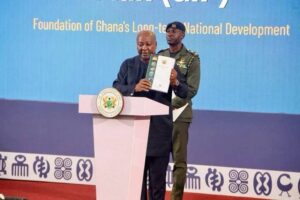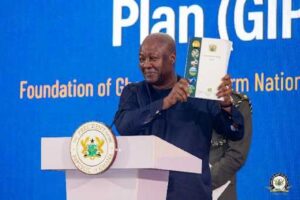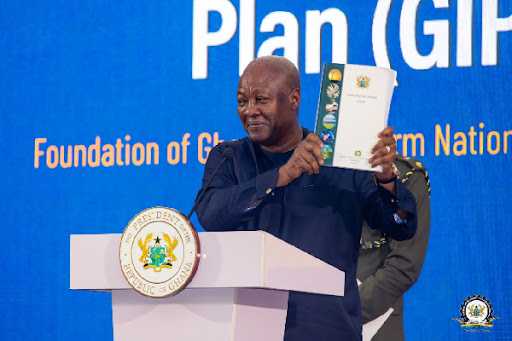President John Dramani Mahama has unveiled the Ghana Infrastructure Plan (GIP), an ambitious 30-year national framework aimed at transforming Ghana’s infrastructure landscape, eliminating politically motivated projects, and fostering sustainable development across all regions. The plan, launched in Accra on October 22, 2025, represents a landmark shift toward long-term, evidence-based national planning intended to ensure continuity, accountability, and equitable distribution of resources.
The GIP, developed by the National Development Planning Commission (NDPC), outlines nine strategic pillars spanning energy, water, transport, human settlements, and housing. It seeks to address persistent regional inequalities and bridge the economic divide between Ghana’s southern urban centres and its underdeveloped northern regions. Speaking at the launch, President Mahama said the plan was a bold effort to “break the cycle of fragmented, politicised projects and replace it with a unified development vision that spans generations.”
The blueprint introduces key fiscal safeguards designed to prevent unsustainable debt accumulation and ensure prudent resource management. Among these are a legally enforceable debt ceiling set at 45% of Gross Domestic Product by 2034 and the establishment of a Fiscal Responsibility Council to monitor and enforce fiscal discipline. These mechanisms are expected to curb the recurring problem of over-expenditure and cost overruns that have plagued past national projects.

President Mahama drew inspiration from Ghana’s founding leader, Dr. Kwame Nkrumah, whose 1963 seven-year development plan envisioned infrastructure as the backbone of an industrialised nation. However, Mahama lamented that Ghana had yet to realise Nkrumah’s dream, citing a 2024 NDPC report that revealed over GH₵70 billion in cost overruns across 18,000 capital projects — many delayed or abandoned. “We inherited Nkrumah’s dream, but we have yet to fulfill its promise,” he remarked. “This plan is our strategic reset to complete that unfinished mission.”
A core feature of the Ghana Infrastructure Plan is the creation of a new green digital city, which will combine sustainable architecture, renewable energy, and digital innovation to attract global investors and establish Ghana as a regional hub for technology and environmentally responsible development. The project reflects the country’s aspiration to align urban growth with sustainability standards that meet international investment criteria.
The plan also prioritises water infrastructure in the Northern Region, aimed at ensuring equitable access to clean water and improving public health outcomes. Additionally, strategic transport corridors will be developed to enhance connectivity between regions, boost trade efficiency, and reduce the chronic congestion that burdens major urban centres like Accra and Kumasi.
President Mahama emphasised that the GIP would be enshrined in law through Parliamentary approval to ensure continuity across political administrations. This legal backing aims to prevent successive governments from abandoning inherited projects, a practice that has historically undermined national progress. “Our goal is to create a system where no project is left behind simply because of political change,” he said.

To tackle the longstanding development gap between northern and southern Ghana, the president announced targeted incentives to attract foreign investment to the north. A new Agro-Industrial Park will serve as an anchor for agribusinesses, generating jobs and reducing rural-urban migration. Mahama highlighted that many young people in northern Ghana migrate to the south after completing school due to limited economic opportunities — a trend the government hopes to reverse through region-specific industrialisation.
Funding for the plan’s initial phase will come from the government’s Big Push Initiative, which has earmarked GH₵13.9 billion for infrastructure spending in 2025. The initiative will serve as a launchpad for the broader 30-year agenda, prioritising high-impact projects in energy, transport, water, and digital infrastructure.
In a decisive move toward accountability, President Mahama disclosed that the acting Chief Justice had agreed to establish specialised courts to expedite the prosecution of individuals found guilty of embezzling public funds. He referenced an incident in which hospital staff continued paying a deceased employee’s salary for more than two years as evidence of the urgent need for institutional reform. The newly proposed Fiscal Responsibility Council will have powers to impose sanctions under the Public Financial Management Act, ensuring that fiscal oversight is backed by real consequences.
The Ghana Infrastructure Plan also carries deep political and social implications. Rural and underdeveloped communities have long complained of marginalisation in national development, arguing that infrastructure investment remains overly concentrated in Greater Accra and southern Ghana. The plan’s focus on balanced regional growth is designed to correct these imbalances and foster nationwide economic participation.
Improved water and transport systems in the Northern Region are expected to transform agricultural production, reduce post-harvest losses, and enhance school attendance by addressing the long-standing challenge of water scarcity. The proposed strategic road networks will connect previously isolated communities to national and regional markets, improving livelihoods and facilitating the movement of goods and people.

The green digital city component embodies Ghana’s forward-looking ambition to leapfrog traditional industrialisation pathways by embracing technology and sustainability as core economic drivers. Rather than constructing conventional infrastructure that requires later retrofitting, Ghana intends to integrate renewable energy, smart grids, and green urban planning from inception. However, analysts have cautioned that attracting the level of private and foreign investment required will depend heavily on Ghana’s macroeconomic stability and governance credibility.
Experts note that the success of the Ghana Infrastructure Plan hinges on consistent implementation, competent project management, and a depoliticised commitment to national development. Ghana’s past is littered with ambitious frameworks that faltered at the execution stage due to weak oversight, corruption, and shifting political priorities. The introduction of fiscal enforcement mechanisms and judicial support is therefore seen as an encouraging step, though execution will remain the ultimate test.
For investors, the plan presents both opportunity and risk. The immediate GH₵13.9 billion investment for 2025 signals significant government demand for construction, logistics, and consultancy services. The 30-year horizon offers potential for long-term partnerships across sectors, from renewable energy to transport and housing. Yet Ghana’s current fiscal pressures and debt management constraints will likely make investor confidence contingent on credible policy enforcement and stable governance.
The Ghana Infrastructure Plan’s alignment with the African Union’s Agenda 2063 and the United Nations’ Sustainable Development Goals also opens pathways for international partnerships and multilateral funding. By embedding its infrastructure strategy within global frameworks, Ghana stands to attract concessional financing, technical expertise, and public-private collaborations that could amplify its domestic investment capacity.
Ultimately, the Ghana Infrastructure Plan represents both a vision and a challenge — a roadmap to a modern, equitable, and resilient nation that must be navigated with discipline and continuity. Whether this ambitious blueprint will materialise into tangible transformation or remain another entry in Ghana’s long list of unfulfilled development plans will depend on the government’s capacity to sustain focus, maintain fiscal integrity, and unite political actors around a shared national agenda.
Cybersecurity Gaps Could Cripple Economic Progress, President Mahama Cautions

